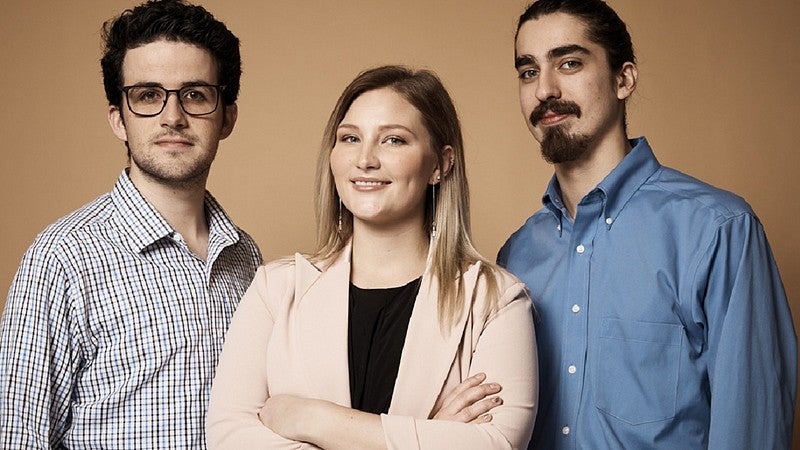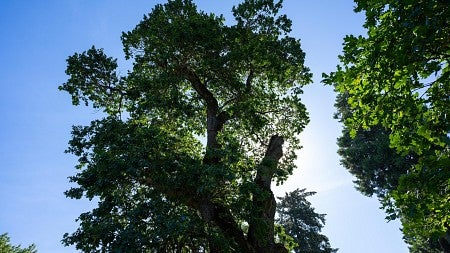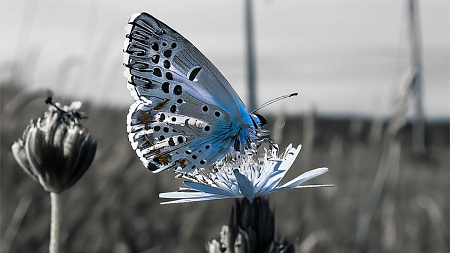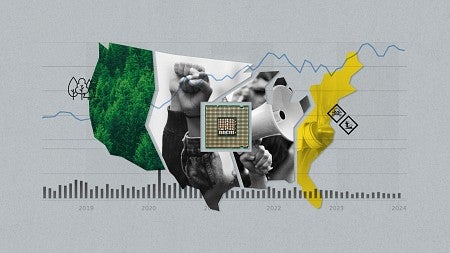
Basic Article Headline Sample: Keep Your Headlines Succinct
Recent UO graduates launch a business to help solve a pressing environmental challenge
By Ed Dorsch • Photo courtesy Algotek • April 3, 2019
3 min read
All those plastic straws, forks, spoons, bags, and water bottles add up to one big environmental problem. By many estimates, nearly half the plastic produced worldwide becomes a single-use product.
Much of that ends up in landfills, the ocean, and as microscopic particles in the fish we eat. But a trio of recent UO graduates is working to solve the growing problem of single-use plastics—by making plastic that’s not a problem.
David Crinnion and Tanner Stickling, both material and product studies majors, and Justin Lebuhn, an environmental studies major, launched Portland-based Algotek in 2018. They’re marketing the company’s biodegradable plastic as an alternative material for packaging and other items that are used only once. The bioplastic dissolves in water, and you can eat it (kind of).
“It’s as edible as cardboard,” says Crinnion. “We can’t market it as food. But I have eaten small amounts to demonstrate that our product, which is made from brown algae, is totally benign.”
Like many great ideas, it all started on a whim. Unlike most great ideas, it’s going somewhere—in part because it was hatched on the UO campus, where an interdisciplinary ecosystem of faculty members and resources helps students transform innovative concepts into viable businesses.
Algotek was inspired by the versatility of a seaweed-based membrane.As undergraduates, the group participated in the university’s 2017 Sustainable Invention Immersion Week, an annual entrepreneurial boot camp and competition for green business ideas. Inspired by Ooho—an edible water orb that’s an alternative to plastic water bottles—they explored the possibilities of its seaweed-based membrane as a greener packaging solution.
“Initially, we thought about taking the water out of the spheres, replacing it with air, and creating an alternative to Styrofoam,” recalls Crinnion. “As it turned out, the membrane was not strong enough. But that was our inspiration.”
Their idea was inspiring enough to earn them second place in the competition—and kick-start an entrepreneurial journey. Crinnion and Stickling immediately approached Kiersten Muenchinger, head of the Department of Product Design and the Tim and Mary Boyle Chair in Material Studies and Product Design, about working on their idea as an independent study project. The group continued improving the material, traveling to business pitch competitions, and learning from mentors outside their majors.
“The faculty members were so motivating,” says Crinnion. “And super helpful. We met with Kiersten once a week, developed assignments, and learned the basics of starting a company.”
Julie Haack, a faculty member in chemistry and biochemistry specializing in green chemistry, helped them refine their plastic recipe. And Kate Harmon, a faculty member in the Lundquist Center for Entrepreneurship, provided substantial support: Harmon flew with the entrepreneurs to Texas to help with a pitch competition and she and colleagues in the center worked continuously with the team on developing their business model, connecting them to grant and accelerator opportunities, and helping them grow their professional network. The center also invested more than $4,000 in the team through grants and paying for their travel to business competitions. Meanwhile, the Regional Accelerator and Innovation Network offered work space, so the team could move their lab out of an apartment.
Today, the Algotek team is working with an Oregon manufacturer to make the final tweaks to their new ecoplastic. They hope to start producing and licensing it this year. Businesses from across Oregon, the US, and even India have contacted them.
The possibilities for specific products are so diverse, they’re keeping their options open to whatever the market demands. But their ultimate mission is laser-sharp.
“Ultimately, we want to combat waste generated from traditional plastics,” says Crinnion. “Even if we fail, we’re hoping this will motivate others to pursue their ideas for a solution. We need to disrupt this market.”
Ed Dorsch, BA ’94 (English, sociology), MA ’99 (journalism), is a staff writer for University Communications.




